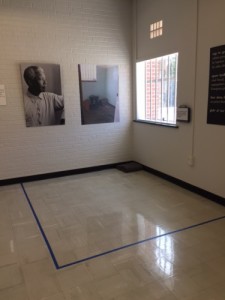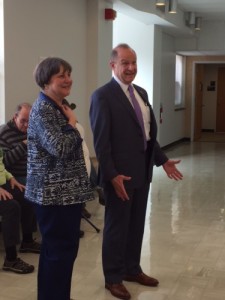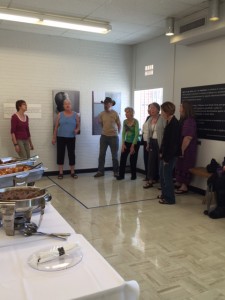WCU’s Mountain Heritage Center held a reception on March 16 to showcase their exhibit, ‘From Apartheid to Democracy’. The reception included South African food and music, as well as several new additions that have been made to the exhibit since it opened on Feb. 1.

Bunny chow is veggie curry in miniature bread bowls. Photo credit: Haley Smith.
Some of the foods included in the reception were peri peri chicken wings and South African chutney chicken bites. Also on the menu was a mini vegetable curry in a bread bowl called ‘bunny chow’ and Melktert, a mini custard pie desert.
A community choir called ‘Ubuntu’, which means ‘I am because of who we are’ in Zulu, performed several traditional African songs at the event.
One of the additions to the exhibit was a physical recreation of Nelson Mandela’s prison cell. Tape on the floor laid out the dimensions of the cell, a blanket was placed in the corner and temporary bars were built into the window.
When the exhibit first opened, Pam Meister, the curator and interim director of the Mountain Heritage Center, spoke briefly about their plans to put together an exhibit on Cherokee voting rights in order to connect the conflict of apartheid to Appalachia.

A recreation of Nelson Mandela’s prison cell layout on Robben Island. Photo credit: Haley Smith
Katie Welch, an intern for the Mountain Heritage Center, and Justyn Kissam, a WCU grad student working with the Mountain Heritage Center constructed an exhibit devoted entirely to this issue.
This is their first time creating an exhibit, and they didn’t know anything about the topic before beginning their research in mid-January.
The seven-panel exhibit discusses how local, Western North Carolina, politics affect the Cherokee – specifically prior to World War II. When the Cherokee were eligible to vote, they voted many Republicans into office, prompting the Democrats to challenge Cherokee citizenship.

Some of the panels in the new Cherokee voting rights portion of the exhibit. Photo credit: Haley Smith
“There were a lot of questions about who they actually are and how they fall into the local government,” said Welch. “It brought up the issue of, are Cherokee actually citizens of the United States, or are they wards of the United States?”
According to the exhibit, the fight for Cherokee voting rights ended with World War II and the desegregation of the military.
“The Cherokee tribe is a nation within a nation,” said Welch. “The relationship between the U.S. government and the tribal government is still on rocky ground.”
Among the people attending the reception was Chancellor David Belcher.

Chancellor David Belcher and Pam Meister discuss the exhibit. Photo credit: Haley Smith
“I’m fascinated with [the exhibit],” said Belcher. “I’m particularly fascinated because my wife and I are going to South Africa this summer.”
Belcher explained that he and his wife are planning to travel to South Africa on vacation, but will arrive a few days early to meet up with WCU students who are working with the Samaritan’s Feet project to put shoes on the feet of African children.
Belcher said that the apartheid exhibit was “very effective” and aligns well with the university theme.

The community choir, Ubuntu, performs traditional South African songs at the reception. Photo credit: Haley Smith
“I have clear memories of when Nelson Mandela was released from prison and when he was elected, so a lot of [the exhibit] is bringing those memories back for me,” said Belcher.
According to Meister, the exhibit has been very successful so far and it has drawn attention from several WCU classes in various majors. Primary schools have also been bringing students to the exhibit.
“It’s been remarkable to see the different connections [people make],” said Meister. “Some people connect with the political story, some connect with the cultural side, and some are interested in the parallels [to Western North Carolina].”
Meister explains that that is the aspect that makes working in museums so enjoyable.
“It’s never quite the same,” said Meister. “Every [exhibit] is a new one and every one’s an adventure.”
The exhibit will remain open in the MHC on the second floor of the library until May 20.


